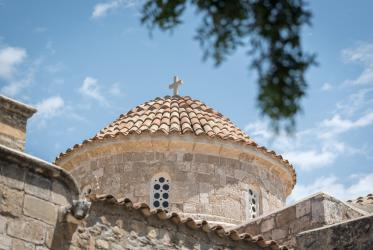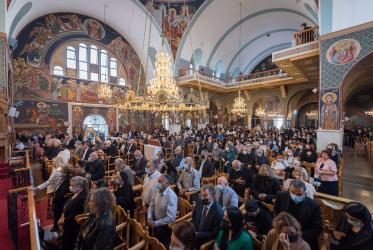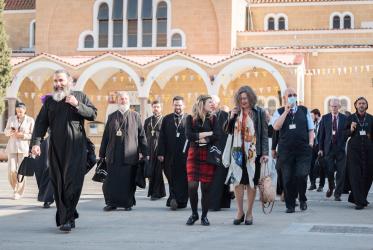by Voitto Huotari, Bishop of Mikkeli, Evangelical Lutheran Church of Finland
The proposal
Metropolitan Kirill, in the name of the Department for External Church Relations of the Moscow Patriarchate, has proposed the transformation of the World Council of Churches into a "two chamber body" (The Ecumenical Review, vol. 51, no. 4/1999). The proposed model is intended to be a solution to the problem that the Orthodox have been fully responsible for the agenda and actions of the WCC, which has in turn sometimes proved to be unacceptable for Orthodox teaching and the Orthodox tradition. The WCC has performed two functions: 1) serving as a common body of churches on their way towards unity and 2) serving as a forum for discussing the Christian attitude towards the world. According to Metropolitan Kirill, these two functions cannot be successfully fulfilled within a single structure and system of decision-making. The problem of Orthodox participation in the WCC lies in precisely this confusion of two functions within the single structure of the WCC.
The two bodies could be a "council" and a "forum". The function of the council (the "first chamber") would be to discuss problems of concern for member churches and to seek a place for solving them. There is a variety of opinions and attitudes on questions challenging the churches today, and in this "first chamber" the most acute and challenging problems faced by churches of various traditions could be discussed. The paradigm for this body would be diversity, respect for different points of view, etc. The model of membership, the discipline of responsible decision-making, the rules and other attributes of a democratic institution existing today in the WCC should be retained in this chamber. The "second chamber" of the WCC could become a world forum for Christian churches and/or confessions. Its principle goal should be the task of restoration of Christian unity. The forum should also discuss problems of mission, religious education, diakonia, human rights and political and global issues. The only principle of decision-making in the forum should be consensus. The forum could reflect the structure of the "confessional families" existing in the world of Christianity, namely, Orthodox, Catholic, Reformed and Free churches. Participating in the forum could also be the churches which cannot assume the full commitments involved in membership of the WCC.
Reflections
- Metropolitan Kirill's proposal shows that the Russian Orthodox Church has made a commitment actively and constructively to seek a solution to the problem of Orthodox participation in the WCC. The proposal expresses the experiences and views of the largest member church in the WCC and deserves careful analysis.
- It is a positive sign that Metropolitan Kirill's proposal is based on developing the WCC's own structures, not primarily on organizations to be created outside it. Recently the danger has been that the main arteries of ecumenism pass the WCC by. Many churches put their greatest efforts into producing bilateral ecumenical agreements (Porvoo, Leuenberg, the Joint Declaration on the Doctrine of Justification), and the WCC comes only second in order of priority. New forms also need to be found for broadening and deepening ecumenical debate. But the first objective must be to see how the activities and structures of the WCC can be renewed in the way the churches want. If this is not sufficient from the viewpoint of the ecumenical movement, only afterwards can one begin to create structures outside it. New organizations also demand greater economic and spiritual resources, and it is not certain that the member churches will provide them.
- The forum can only be meaningful if the Roman Catholic Church and the Pentecostal and Evangelical movements take part. If they are involved, the forum is worth setting up in any case. So far the forum has been planned by the WCC, and we do not know whether others will join it. The WCC cannot dictate the ways in which Roman Catholics and Pentecostals arrange ecumenical meetings, but they must be planned together.
- The forum proposed by Metropolitan Kirill is different from that outlined at Harare - the "Forum of Christian Churches and Ecumenical Organizations". The forum proposed by Metropolitan Kirill is clearly made up of churches and church families, while the Harare forum also has room for various ecumenical movements. Now the problem is that one does not always know whose opinion is represented by the decisions of the WCC and how binding each decision is. It is necessary to strengthen the churches' voice in the WCC, so that one knows with certainty which church or organization a person represents and on what authority he or she acts. If the influence of movements and experts acting independently of the churches increases, it can lead to a situation where the churches do not feel at home in the WCC.
- It is interesting that church families are included in Metropolitan Kirill's proposal, because there have been favourable developments within them. But especially the Protestant church families are disunited. For example, we Lutherans are not the same as the other churches of the Reformation. The internal heterogeneity of the church families remains unnoticed. The great problem of the paradigm is that a double structure would be created and the churches could not directly exercise influence in the way they would like but only through the church families.
- The division of matters between the forum and the council seems indefinite and problematic. According to the proposal, the forum would discuss, in addition to questions of unity, mission, religious education, diakonia, human rights, and political and global issues. Its scope would be partly the same as that of the council. Is the only difference that these matters would be discussed from the point of view of fellowship and not of diversity? If the basic ecumenical goals of the churches are realized in the forum, what significance would remain for council-type work? On the other side the problem could be that the work of the forum would remain on the general level. My question is also how a forum that demands less commitment can achieve more ecumenically than a council that demands more commitment?
- The procedure of the forum planned at Harare would mainly be sharing experiences, while the forum proposed by the metropolitan would mainly use other methods, and in questions of content would aim at more profound goals. Decisions of consensus are in accordance with theology and church tradition in doctrinal matters. Their nature and use in ecumenism deserves careful study. Can one use them in the existing structures, dividing maters into those which require consensus, and those which do not require it?
- In its duties and goals the forum proposed by Metropolitan Kirill is like Faith and Order. Here too the goal is unity, and the ecumenical method is doctrinal study and not merely the sharing of experiences. The activities of Faith and Order have always included in a deep sense spiritual issues and worship and liturgy. Methodologically it has applied the principle of consensus: consensus is declared together, but it has been sufficient to show how far it has progressed (e.g. BEM). To what extent can the goals of the proposed forum be achieved by developing the work of Faith and Order and raising it to a central place in the WCC?
- According to the proposal, the forum would observe the principles of the Toronto Statement. According to them, the member churches would not need to commit themselves to very much, the WCC cannot participate in doctrinal talks leading to communion between churches, nor is the WCC the purpose of ecumenism but its instrument. If the Toronto Statement is observed, the principal task of the forum cannot be the task of restoration of Christian unity. The principles of the Toronto Statement were drawn up for the council, and the forum would need to be defined in a different way from the council.
- In Metropolitan Kirill's proposal the churches could choose whether they would be members of the forum alone or of both the forum and the council. Some Orthodox and Protestant churches, too, might withdraw from close council work to the looser forum work. Their commitment to the WCC would decrease. The ecumenical goal of staying together would not be realized. The two-chamber paradigm would probably lead o the splitting up of the ecumenical movement and the weakening of the WCC, perhaps to schism as well.
- Since Vancouver the WCC has lived in a state of ferment in institutions and organizations. Overshadowed by discussion of structures there has for decades been discussion of ecumenical substance and important theological issues. The theological matters behind the crisis with the Orthodox have not been discussed. It is difficult to see how by demolishing structures one can achieve serious joint study of the matters of content which bother the Orthodox, and many Protestants too, in the ecumenical movement.
- Metropolitan Kirill's proposal highlights in an authoritative way the structural obstacles to ecumenical activities and seeks solutions to them. Because as regards the forum the proposal is concrete, it forces us to continue the discussion, making use of more precise and better-defined terms.




